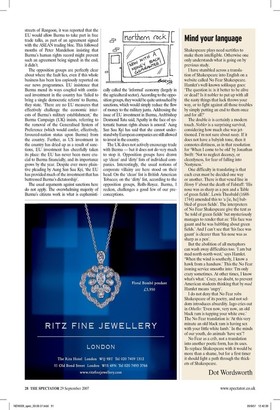Mind your language
Shakespeare plays need surtitles to make them intelligible. Otherwise one only understands what is going on by previous study.
I have stumbled across a translation of Shakespeare into English on a website called No Fear Shakespeare. Hamlet's well-known soliloquy goes: 'The question is: is it better to be alive or dead? Is it nobler to put up with all the nasty things that luck throws your way, or to fight against all those troubles by simply putting an end to them once and for all?'
The double is is certainly a modern touch. Nobler is a surprising survival, considering how much else was jettisoned. I'm not sure about nasty. If it does not have a babyish tone, then it connotes dirtiness, as in that resolution for 'When I come to be old' by Jonathan Swift: 'Not to neglect decency, or cleenlyness, for fear of falling into Nastyness.'
One difficulty in translating is that each crux must be decided one way or another. There is that vexed line in Hemy V about the death of Falstaff: 'His nose was as sharp as a pen and a Table of green fields'. Lewis Theobald (16881744) amended this to 'a [ie, he] babbled of green fields'. The interpreters of No Fear Shakespeare give the text as 'he told of green fields' but mysteriously manages to render that as: 'His face was gaunt and he was babbling about green fields.' And I can't see that 'his face was gaunt' is clearer than 'his nose was as sharp as a pen'.
But the abolition of all metaphors can wash away difficulties too. 'I am but mad north-north-west,' says Hamlet. 'When the wind is southerly, I know a hawk from a handsaw.' This the No Fear ironing service smooths into: 'I'm only crazy sometimes. At other times, I know what's what.' Crazy, no doubt, to prevent American students thinking that by mad Hamlet means 'angry'.
I do not deny that No Fear robs Shakespeare of its poetry, and not seldom introduces absurdity. Iago cries out in Othello: 'Even now, very now, an old black ram is tupping your white ewe.' The No Fear translation is: 'At this very minute an old black ram is having sex with your little white lamb.' In the minds of our youth, do animals 'have sex'?
No Fear as a crib, not a translation into another poetic form, has its uses. To replace Shakespeare with it would be more than a shame, but for a first timer it should light a path through the thickets of Shakespeare.
Dot Wordsworth























































 Previous page
Previous page